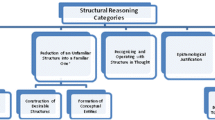Abstract
The tendency to generalize from specific experiences leading to new, more abstract concepts is a natural aspect of human thought. Generalizations are the end result of an inductive process that begins with the identification of similarities in seemingly disparate situations. It is the existence of such generalizations that makes it possible for us to understand each other and the world around us. It is pedagogically weak to present generalizations to students and expect them to know how and when to apply them. On the other hand if students experience the inductive process in classrooms and discover generalizations, they are likely to remember and use this process when tackling other problems. The authors illustrate the pedagogical value of such an approach and the interdisciplinary nature of the inductive process by reflecting on teaching practices in English literature and mathematics in a high school classroom. In particular the authors reflect on how the inductive process was applied to four short stories and four problem-solving situations, which resulted in high school students arriving at generalizations that characterized the stories and the problems. A conceptual model that illustrates how inductive processes facilitate generalizations in the classroom is presented.
Similar content being viewed by others
References
Frost, R. (1920).Mountain interval. New York: Henry Holt and Company.
Gardner, M. (1997).The last recreations. New York: Springer Verlag.
Hamers, J., de Koning, M., Sijtsma, K. (1998). Inductive reasoning in third grade: Intervention, promises and constraints.Contemporary Educational Psychology,23(2), 132–148.
Hardy, G.H. (1992).A mathematicians’s apology. Cambridge: Cambridge University Press.
Harste, J.C. (1999).Re-imagining the possibilities of NCTE. Speech given at NCTE Affiliate Roundtable Breakfast. Retrieved from http://www.ncte.org/issues/coreintro.html.
Lacey, A.R. (1996).A dictionary of philosophy (3rd ed.). London: Routledge
Lampert, M. (1990). When the problem is not the question and the solution is not the answer: Mathematical knowing and teaching.American Educational Research Journal,27, 29–63.
Lakatos, I. (1976).Proofs and refutations. Cambridge, UK: Cambridge University Press.
National Council of Teachers of Mathematics. (2000).Principles and standards for school mathematics. Reston, VA: National Council of Teachers of Mathematics.
Poincaré, H. (1948).Science and method. New York: Dover Publications.
Polya, G. (1954).Mathematics and plausible reasoning: Induction and analogy in mathematics (Vol. II). Princeton, NJ: Princeton University Press.
Sriraman, B. (In press). Gifted ninth graders’ notions of proof. Investigating parallels in approaches of mathematically gifted students and professional mathematicians.Journal for the Education of the Gifted,27(4).
Sriraman, B. (2004). Discovering Steiner Triple Systems via problem solving.The Mathematics Teacher,97(5), 320–326.
Titus, H. (1994).Living issues in philosophy. Oxford: Oxford University Press.
Tolstoy, L. (1864–1869).War and peace. Retrieved from www.onlineliterature.com/tolstoy/war_and_peace/ (Originally published as a book series)
Vijver, V. (1991). Inductive thinking across cultures.Dissertation Abstracts International,52(4), Section C, 0674.
Author information
Authors and Affiliations
Rights and permissions
About this article
Cite this article
Sriraman, B., Adrian, H. The pedagogical value and the interdisciplinary nature of inductive processes in forming generalizations: Reflections from the classroom. Interchange 35, 407–422 (2004). https://doi.org/10.1007/BF02698891
Issue Date:
DOI: https://doi.org/10.1007/BF02698891




